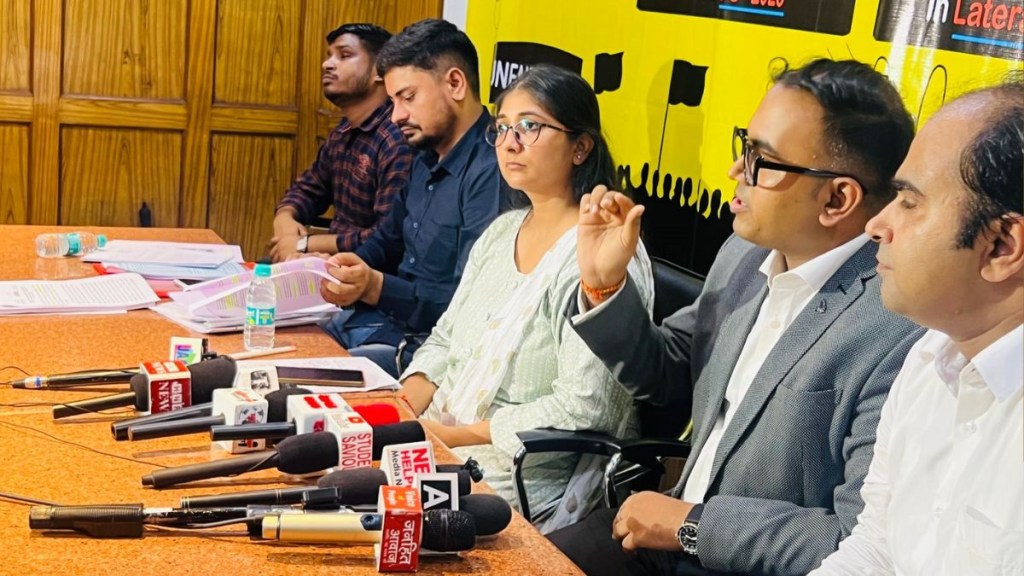A group of Union Public Service Commission (UPSC) aspirants have sought redressal of their grievances alleging that the civil services exam particularly the Civil Services Aptitude Test (CSAT) paper is deliberately sidelining those who belong to Hindi and Vernacular medium. The aspirants called upon the central government to listen to their demands, in a press conference on Monday.
The press conference was attended by several key individuals, including Sidhartha Mishra, the lead petitioner, Ayushi, Hanumant Lal Patel, Umesh Singh, and lawyers Saket Jain and Umesh Singh.
The speakers demanded revision in the qualifying criteria for the UPSC-CSE CSAT 2023 examination, and the removal of the CSAT paper from the preliminary examination to ensure equal opportunities for all candidates. They also highlighted the importance of a compensatory attempt for aspirants affected by the COVID-19 pandemic and the need for an expert committee to evaluate the General Studies (GS) Paper.
The aspirant community has urged the government to lower the qualifying criteria of UPSC-CSE CSAT 2023 exam from 33% to 23%, similar to the reduction made in the UPSC-CDS examination of 2019. Alternatively, they propose the exclusion of the 25 out-of-syllabus questions from the evaluation, similar to the actions taken by UPSC in 2020 and 2021. They have request a re-conduction of the preliminary examination to rectify the exclusion of deserving candidates.
A case has been filed at the Central Administrative Tribunal (CAT) by the UPSC aspirant community, represented by Sidhartha Mishra and others, against the preliminary examination conducted on May 28, 2023. Although the court declined to put a stay on the prelims result, the matter has been postponed until July 6, 2023. The next hearing at CAT is scheduled for July 13, 2023.
The aspirants allege that the CSAT paper on May 28, 2023, contained questions that were out of syllabus, specifically in the topic of Permutation and Combination, which is not covered till grade 10. They also claim that several questions were directly taken from previous years’ IIT and CAT exams. They said that these factors made it extremely difficult to solve the paper within the stipulated time.
The aspirant community has also demanded the removal of CSAT from the UPSC-CSE preliminary examination. They argue that the CSAT paper favours candidates with strong mathematical and technical backgrounds, particularly those from IIT and CAT, while eliminating Hindi and vernacular language students. They pointed that the merit at the preliminary stage should be determined by GS Paper 1, not CSAT. This demand aligns with the UPSC-VISION document of 2019.
In light of the global pandemic, the aspirant community requests a compensatory attempt for all candidates eligible for UPSC-CSE in 2020, 2021, 2022, and 2023. This demand has been recommended by the Department-related Parliamentary Standing Committee on Personnel, Public Grievances, Law, and Justice, as well as supported by more than 100 Members of Parliament from various political parties.
Furthermore, the aspirants raised concerns about the objectivity and specificity of 47 questions out of 100 in GS Paper 1. They argued that these questions lacked clarity, making it difficult to assess whether candidates correctly identified the statements. They call for the constitution of an Expert Committee, including student representation, to evaluate the rapid change in the exam pattern of UPSC-CSE 2023.
The aspirant community has also requested a change in the calculation of a candidate’s age for UPSC-CSE, shifting it from August 1 to January 1 of the year of application. They believe the current age calculation discriminates against candidates born between January 1 and July 31, who are at a disadvantage.

